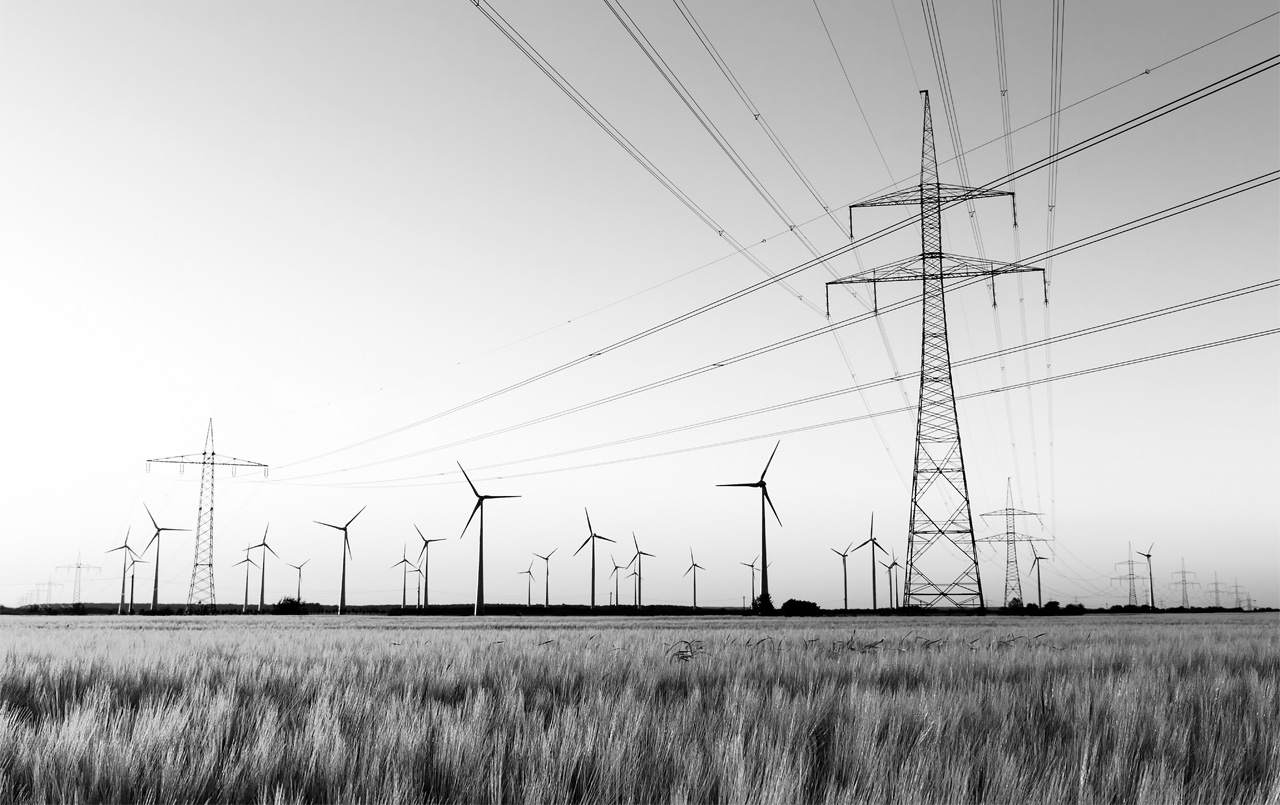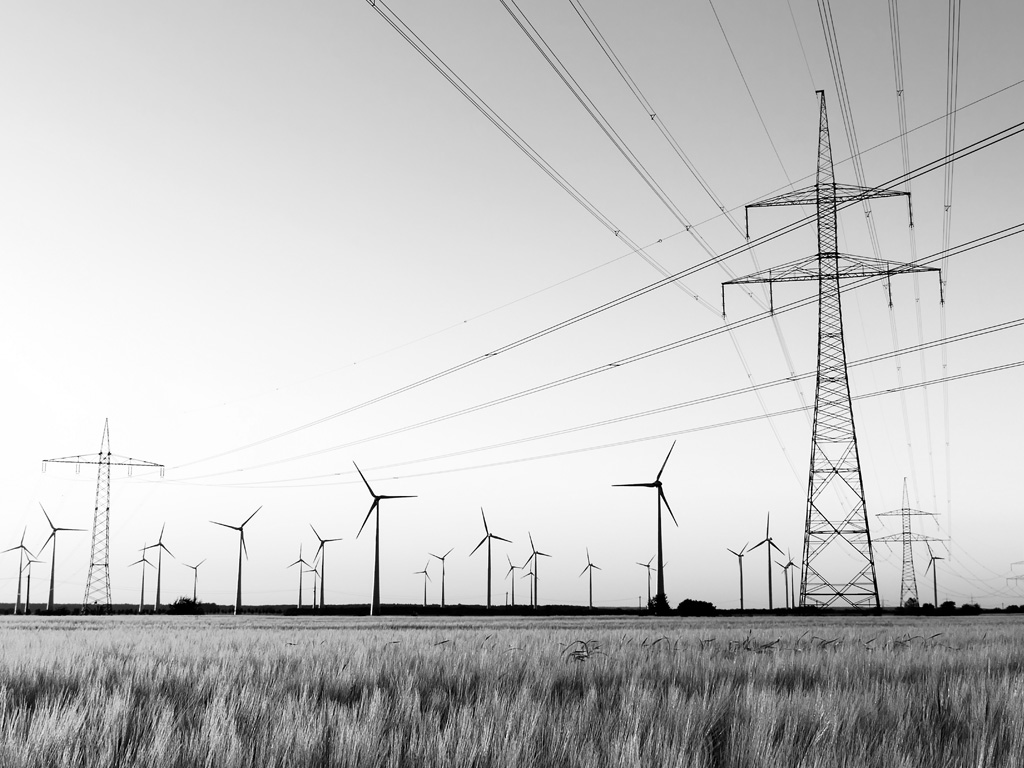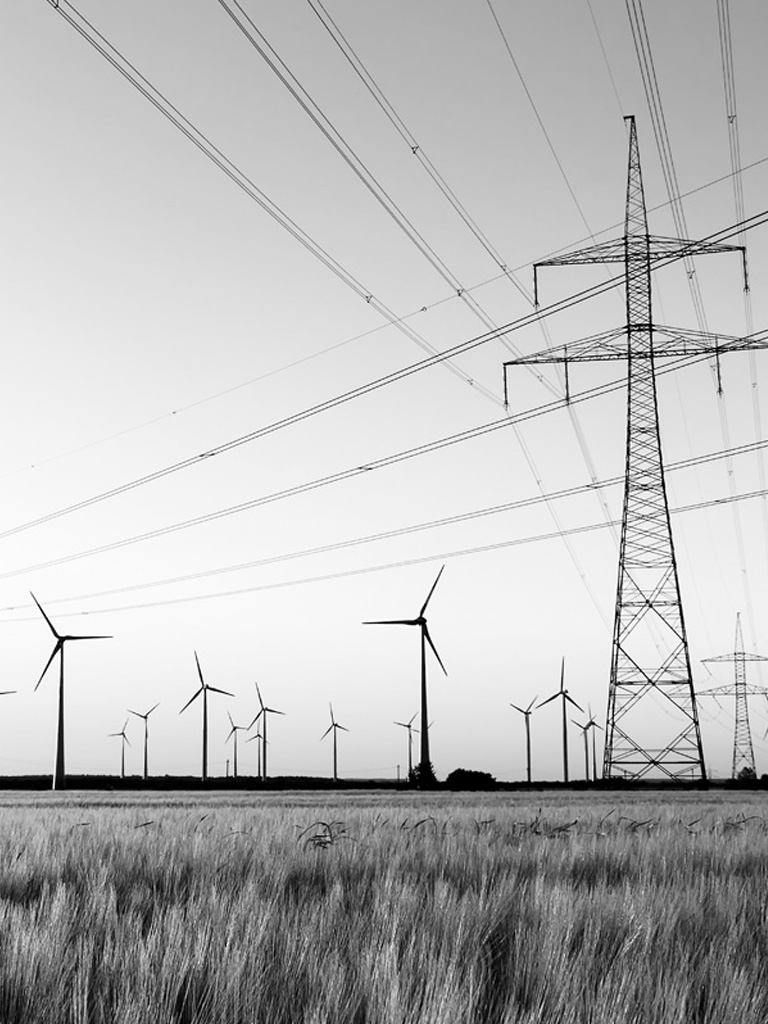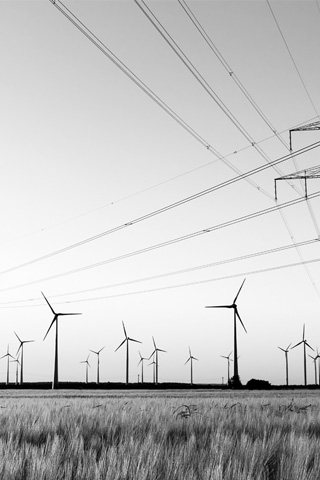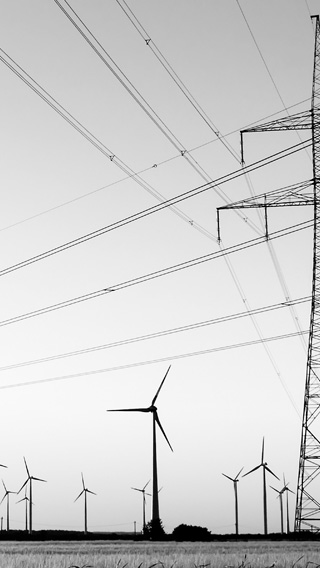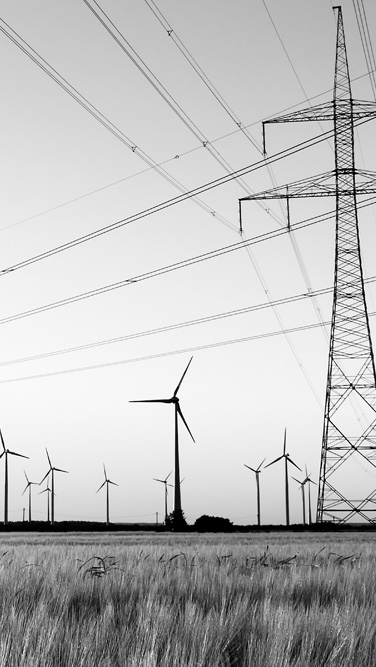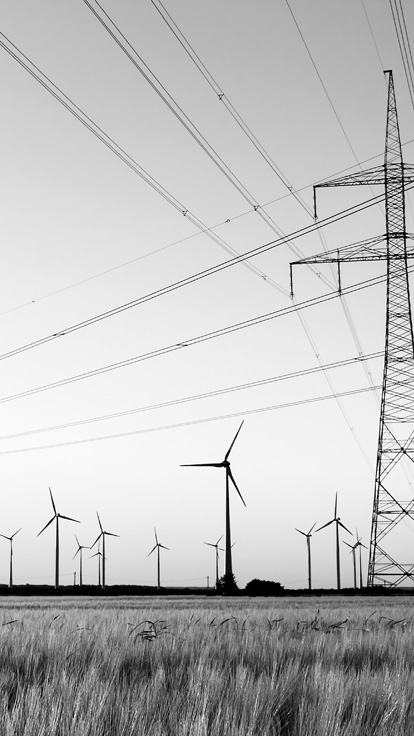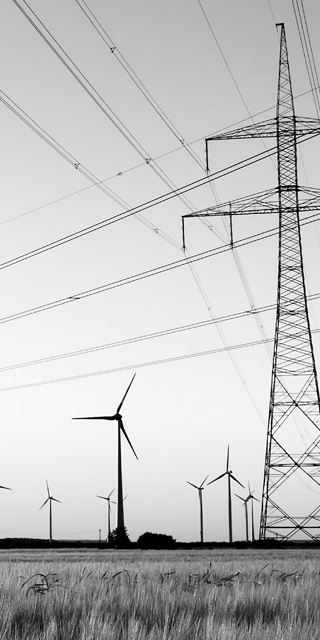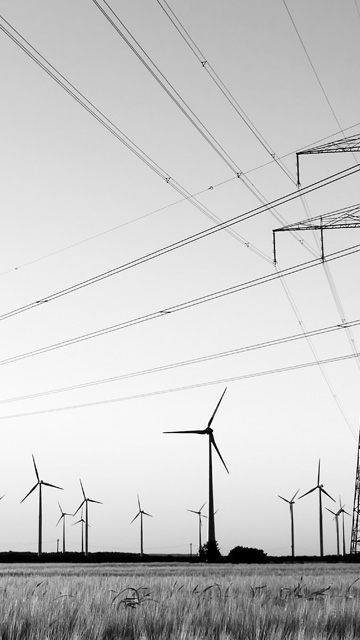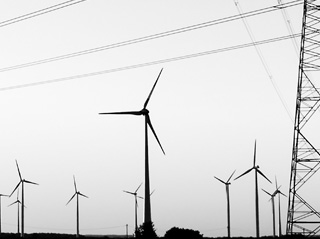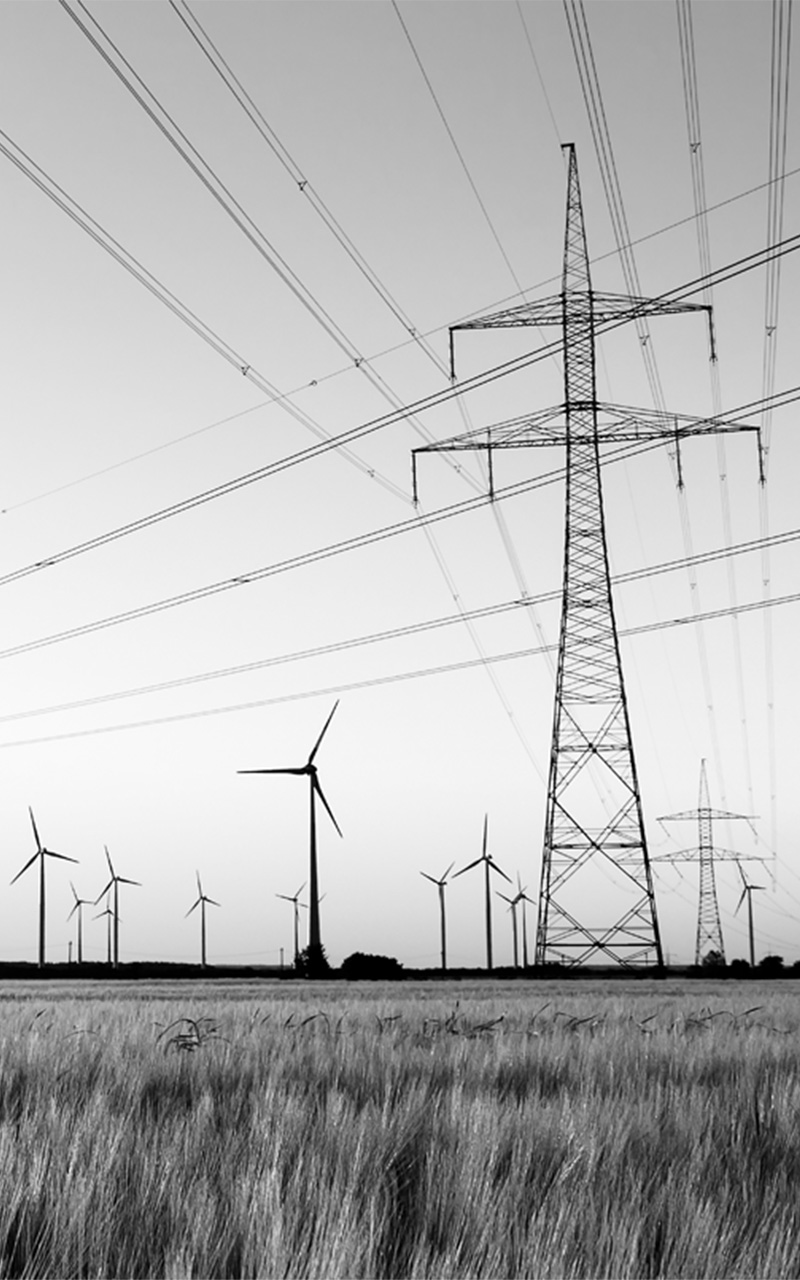-
We believe that communication is key to a global approach for a sustainable use of energy, as well as for tackling anthropogenic climate change. In this context the greenwerk. facilitates delegation trips to Germany in the exciting field of Energy and Climate, for allowing you to complement your expertise with world- class excellence made in Germany.
Germany has a lot to offer: Benefit from decades of experience with sustainable energy and climate policy, understand the details, challenges and success factors of German policy frameworks such as the “Energiewende”, discover experience with flood protection measures in urban areas, gain insights from discussions with key stakeholders, learn how integrated urban climate policy concepts work, or get to know the first-class industry for Renewable Energy Technology (RET).
Our trips are tailor-made - according to your needs, the greenwerk. delegation trips comprise elements such as:
•
Meetings with experts and key decision makers, both on policy and corporate level to reveal success factors for the evolution of sustainable energy and climate policy in Germany, and in your country.
•
Field visits to outstanding projects such as on- and offshore wind farms, energy efficiency measures in heavy industry, flood protection measures or sustainable city quarters.
•
Discussions with private sector initiatives on stakeholder engagement and benefits for individual investments in sustainable energy infrastructure.
•
Interaction on technical details of planning processes and due diligence with project developers and engineers.
•
Field visits to cities to explore urban and municipal climate policy concepts.
•
Workshops on the challenges and opportunities in your region, with local and international experts, policy and decision makers, academia, consultants, stakeholders.
•
Development of action plans for promoting sustainable energy and climate policy in your region, together with you and our experts before, during and after the mission.
•
The delegation trips are prepared, accompanied and followed up by experts of the greenwerk. with the goal to identify your specific questions and needs, and to provide you with answers wherever possible. After your trip we offer to develop solutions together with you and our partners.
Our trips are recommended for small groups. We focus on Northern Germany, with potential to include neighbouring countries. Accommodation is provided in 3-4 star hotels. With our experienced travel management partners, we can take care of logistics and your travel arrangements.
Please contact us for an individual offer that matches your interests and needs.
the greenwerk. climate advisory network
-

The necessity of a turnaround in energy policy is beyond dispute. An efficient and rapid deployment of renewable energy results in significant reductions of GHG emissions as compared to burning fossil fuels, increases energy security and economic viability in terms of total costs.

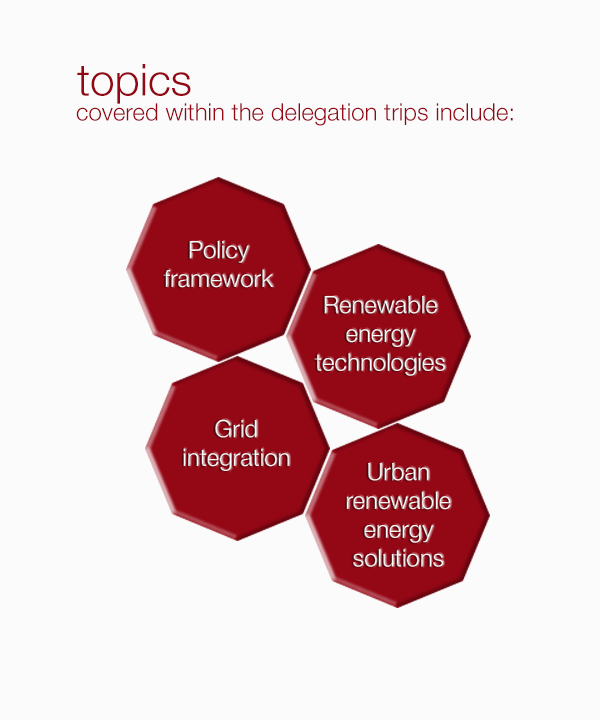

The strategic integration and practical implementation of renewable energy sources into existing infrastructures (both on policy and technical level) is a highly complex subject. The transition to sustainable energy production based on renewable sources calls for a comprehensive climate policy concept with an adequate legislative framework. Technical know-how is required in the areas of planning processes, due diligence, construction, grid integration, system operation, and maintenance. In particular, the challenge of incorporating fluctuating energy production from renewable sources into the existing electricity grid needs to be addressed.

Over the past decades Germany has become a global hub for renewable energies, with more than 85,000 MW installed capacity, and world-class local expertise for manufacturing and re-powering of equipment, optimized generation, transmission, distribution and dispatching of energy, operation and maintenance as well as project planning and development. Today more than 350,000 people work in the field of renewable energies. Key success factors for renewables in Germany are progressive policy frameworks, integrated urban climate policy concepts, stakeholder engagement processes, private sector participation and attractive conditions for the local industry. This expertise is exported globally to all emerging energy markets.
Delegation trips of the greenwerk. let you explore this renewable energy expertise, in order for you to see, understand and learn why renewables have been successful in Germany. We take you to Northern Germany, a region that is full of enthusiasts for energy generation from biomass, hydro, wind, and PV, with expertise across all professions.Example
Renewable Energy made in Germany
Indicative schedule
Day 1: Embedding renewable energies on federal level
•
Arrival, pick up from Airport
•
Welcome and introductory workshop: “Part 1: Renewable Energies as part of Germany’s climate policy”
•
Introductory workshop “Part 2: The German grid system and renewable energies” with insights from experts of the Competence Center for Renewable Energy and Efficiency
•
Guided tour through new urban district “Harbor City”
•
Day 2: Implementing renewable energy projects locally
•
Field trip to the coast of the North Sea
•
Field visit to wind turbine manufacturer and wind farm (on- or offshore)
•
Discussion with local stakeholders and land-owners about citizen participation and the concepts of citizen-owned wind farms
•
Workshop “Technical challenges of integrating wind power into the grid”
•
Day 3: Integrating renewable energy on province level
•
Field trip to Kiel, capital of Schleswig-Holstein
•
Meeting policy makers, business and stakeholders in Kiel
•
Workshop “Political challenges of integrating wind power into the grid”, followed by discussion with experts
•
Harbour Boat Trip
•
Day 4: Urban renewable energy projects
•
Excursion to urban renewable energy production site: “Energy Hill Georgswerder”
•
Workshop “transmission and distribution system operation”, followed by discussion
•
Site-visit to decentralized renewable power plant with thermal storage system
•
Day 5: Summary & Closure
•
Workshop “Challenges for integrating RET into the energy system of my country” (with room for presentations of delegates)
•
Wrap up and feedback
•
Joint lunch
•
Departure
•
Please contact us for an individual offer that matches your interests and needs.
the greenwerk. climate advisory network
-

Energy efficiency is, alongside the further development of renewable energy, the twin pillar of sustainable energy policy. Reducing the amount of energy required to provide products and services will lead to lower energy costs and GHG emissions.

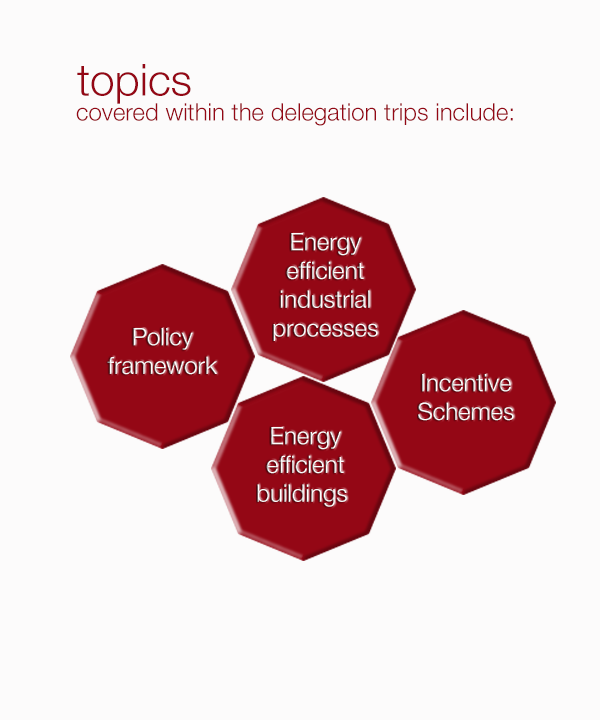

Despite its seemingly obvious benefit in terms of reduced energy costs, energy efficiency measures prove to be difficult to implement at a larger scale. This may have various reasons: depending on the sector, there is a vast range of options for energy efficiency measures. There is no general approach or solution; each option needs to be addressed individually.
Once the potential for energy efficiency has been evaluated, a comprehensive strategy addressing the measures with the biggest impact needs to be set up. The strategy shall encompass financial incentives, regulatory framework and efficient information policy. It shall cover the sector of buildings, private households as well as industry, business, trade and services. Once solutions are on the horizon, successful energy efficiency measures are likely to entail new business models, create further innovations for energy-saving measures and new products. There is much more to it than reducing energy – it can foster innovations and open up new markets.
Germany has already succeeded in handling the use of energy with increasing care: During the last 20 years, economic performance of the country grew considerably whilst energy consumption subsided. The target is to reduce the primary energy consumption by 20% until 2020 and by 50% until 2050 as compared to levels of 2008. In order to reach this target, the German Government issued a comprehensive strategy laid down in the “National Action Plan on Energy Efficiency”.
With an intelligent mix of consulting, communication and information about lucrative efficiency measures, funding facilities and standards for new installations, the Action Plan contains a set of instruments to motivate companies and consumers to raise energy efficiency and take an initial step towards harnessing the enormous potential.
Delegation trips of the greenwerk. let you explore this energy efficiency expertise, in order for you to see, understand and learn that economic growth does not necessarily entail increasing energy consumption and that expertise in energy efficiency is a competitive advantage.
Example
Exploring Energy Efficiency Across Sectors
Indicative schedule
Day 1: Introduction and policy framework
•
Arrival, pick up from Airport
•
Welcome and introductory workshop: “Part 1: Challenges in energy transition and energy efficiency” with insights from experts of the Competence Center for Renewable Energy and Efficiency
•
Introductory workshop “Part 2: Energy Efficiency made in Hamburg” and discussions with authorities from the City of Hamburg
•
Guided tour through new urban district “Harbour City”
•
Day 2: Creating incentives for Energy Efficiency
•
Meeting members of the Hamburg Chamber of Commerce to discuss incentives for energy efficiency
•
Workshop on the role of energy consulting and public involvement
•
Site visit to a SME selling energy efficient device (e.g. heat pumps, smart meters…)
•
Introduction to “Smart Power Hamburg”, a project for smart grids in cities by local utility Hamburg Energie
•
Day 3: Energy efficiency in industry & business
•
Site visit to waste water treatment plant with above average energy efficiency performance
•
Site visit to heavy industry site (e.g. aluminum or copper production)
•
Workshop “Discussion on financial incentives for energy efficiency in industry and business”
•
Site visit to decentralized energy production site or CHP-Plant
•
Day 4: Energy efficiency in the building sector
•
Site visit to EnergieBauZentrum Hamburg (Information Center for efficient housing and energetic refurbishment)
•
Workshop on financial incentives for energetic refurbishment of buildings (Hamburgische Investitions- und Förderbank), followed by discussion
•
Excursion to examples of innovative and energy efficient buildings
•
Day 5: Summary & Closure
•
Workshop “Challenges for implementing energy efficiency measures at a large scale in my country” (with room for presentations of delegates)
•
Wrap up and feedback
•
Joint lunch
•
Departure
•
Please contact us for an individual offer that matches your interests and needs.
the greenwerk. climate advisory network
-

Flood risks from rivers will increase significantly in the coming decades, not only because of extreme weather events induced by man-made climate change, but also due to increasing urbanization of river areas and soil subsidence.

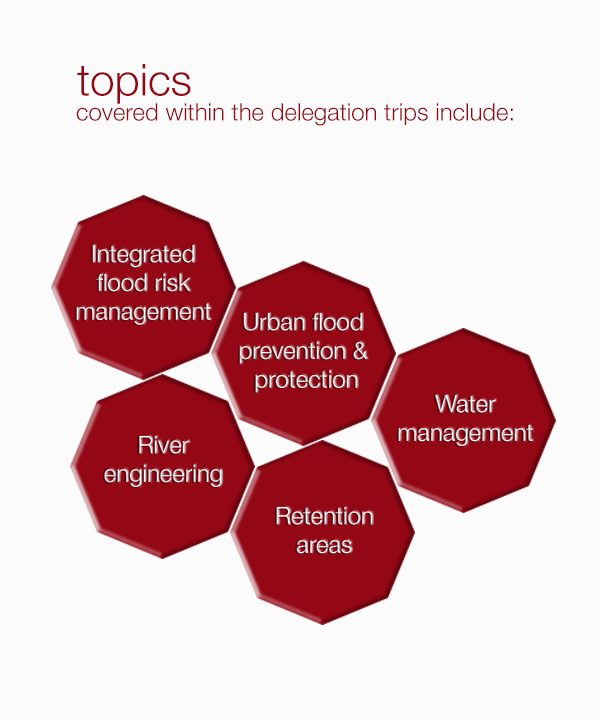

This calls for integrated solutions for coastal/ flood protection and flood risk management to make especially urban areas more resilient to flood risks. On the strength of past experiences, the answer to increased floodings is not merely the adjustment of flood defense works like dykes but also the creation of natural retention areas such as floodplains, improved structure of watercourses and development of riparian forests. In addition, these measures should be flanked by pro-active spatial planning, building prescriptions, warning systems, evacuation- and recovery plans.

With its northern part being particularly prone to river and coastal floodings, Germany has acquired centuries of experience in flood protection measures in urban areas. Located at the shores of the Elbe River, 120km upstream from the North Sea, Hamburg’s urban development has always been highly influenced and economically driven by the presence of this waterway and the vicinity to the sea. The particularity is that the Elbe River is subject to the tides of the North Sea, leading to an average change in water levels of 3,5m daily. The flood protection structures need to meet these specific requirements. In addition, certain wind conditions at the North Sea frequently lead to storm floods in the Elbe River. The most severe flooding in Hamburg in 1962 with more than a 300 deaths led to the largest expansion of flood protection structures of the city. Now, another expansion is starting in order to account for the impact of sea level rise and more severe weather events.
Delegation trips of the greenwerk. let you explore this specific know-how in Hamburg and neighboring provinces, with the aim to make you see, understand and learn the success factors for your local circumstances.
Example
Flood Protection Measures in Northern Germany
Indicative schedule
Day 1: Urban flood prevention
•
Arrival, pick up from Airport
•
Welcome and introductory workshops: “Adaptation as part of Hamburg’s Climate Plan”
•
Overview on flood protection and port management with representatives of
Hamburg Port Authority (HPA)•
Introduction into the flood warning systems in Hamburg
•
Day 2: Adaptation measures: Mitigating river floodings
•
Discussion of success factors for the evolution of integrated flood risk management in urban areas
•
Introduction to the concept for the sustainable development of the tidal river Elbe as a lifeline of the metropolis region Hamburg
•
Site visit to Hamburg’s biggest water retention pilot project Kreetsand and to one of the last stretches of riparian forest
•
Harbour Boat Trip
•
Day 3: Coastal Flood Protection: Field trip to Schleswig-Holstein
•
Meeting with policy makers at the Department for Water Management, Ocean and Coastal Protection
•
Visit to the North-Sea Exhibit: Following the history of dyke construction and costal protection
•
Site visit to one of Europe’s biggest flood barriers: the „Eidersperrwerk“
•
Excursion to UNESCO World Heritage site “Wadden Sea”
•
Day 4: Adaptation measures: Mitigating pluvial floodings
•
Discussing the most recent project on sustainable rainwater management with involved stakeholders and authorities
•
Workshop on the potential impacts of climate change on the drainage infrastructure of coastal urban areas with authorities and research
•
Site visit to the newly developed “HafenCity”: urban development outside of the
primary flood defences•
Day 5: Summary & Closure
•
Discussion of overall flood risk governance issues with local experts and consultants
•
Wrap up and feedback
•
Joint lunch
•
Departure
•
Please contact us for an individual offer that matches your interests and needs.
the greenwerk. climate advisory network
-

Today, 54 per cent of the world’s population lives in urban areas, a proportion that is expected to increase to 66 per cent by 2050. These agglomerations provide both challenges and opportunities for environmentally-conscious development. Local governments can contribute significantly to GHG emission reduction and a city’s path towards a sustainable habitat.

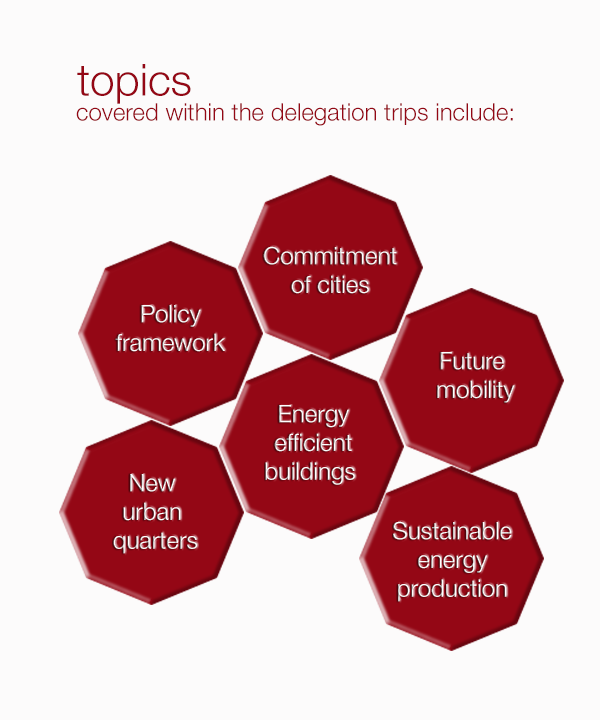

The resource-friendly and sustainable development of a city is recently gaining increasing attention. Within existing national policy frameworks, local governments are required to develop innovative concepts for the energy industry, energy policy, mobility and urban planning. It’s a truly multi-disciplinary task to master a cities’ development towards sustainability targets.
Despite all individualities, cities and local governments can benefit from each other when exchanging ideas and experiences. It starts with identifying potentials, defining sustainability targets and translating those into measures. Questions on how to incentivise the desired strategic, technical or behavioral changes need to be answered. The implementation and putting into practice of those measures is the next challenge.
Already in 2002, Germany published a comprehensive national sustainability strategy. Its overarching guidelines are inter-generation fairness, quality of life, social solidarity and international responsibility. These aims are translated into fields of action, namely sustainable economics, energy and climate and the use of water. The fact is that sustainable development can not be forced upon people from the top. So the national guidelines have to be understood as recommendation – the route has to be tackled with individual measures.
Hamburg has been chosen as “European Green Capital” in 2011 for its comprehensive approaches, policy commitment and necessary funding to become a sustainable city. The city is very successful in reducing energy consumption (despite the large industries and the port), and is currently realizing one of Europe’s biggest urban quarter developments taking most up-to-date standards of land-use, energy-efficiency and mobility aspects into consideration.
Delegation trips of the greenwerk. let you explore the different elements of implementing sustainability issues in the urban context in Northern Germany and Denmark in order for you to see, understand and learn the crucial role cities can play in protecting this world for future generations.
Example
Exploring Urban Sustainability Approaches
Indicative schedule
Day 1: Introduction and policy framework
•
Arrival, pick up from Airport
•
Welcome and introductory workshop: “Part 1: ”Sustainability & Masterplan Climate Protection in Hamburg” and discussions with authorities from the City of Hamburg
•
Introductory workshop “Part 2: Challenges of energy transition for urban areas” with experts of the Competence Center for Renewable Energy and Efficiency
•
Site visit to hydrogen refueling station for sustainable public transport in Hamburg
•
Day 2: Hamburg’s sustainability in practice
•
Introduction to “Smart Power Hamburg”, a project for smart grids in cities by local utility
Hamburg Energie•
Excursion to urban renewable energy production site: “Energy Hill Georgswerder”
•
Site visit to examples of innovative and energy efficient buildings in Hamburg
•
Trip through new urban quarter of Harbour-City and visit of the Sustainability Pavillon
•
Day 3: Sustainable City in Denmark
•
Trip to Sonderborg in Southern Denmark
•
Meeting with local policy makers
•
Presentation of the Sonderborg Project Zero CO2, followed by discussion with local experts
•
Evening Reception with local stakeholders
•
Day 4: Urban climate policy in Flensburg
•
Trip to Flensburg
•
Presentation of the “KlimaPakt Flensburg, an example of urban climate policy “Masterplan 100% Climate Protection”, followed by discussion with local policy makers
•
Site visit to municipal utility with insights into future energy generation
•
Dinner with local stakeholders
•
Day 5: Summary & Closure
•
Workshop “What characterizes a “sustainable city” in my country?” (with room for presentations of delegates)
•
Wrap up and feedback
•
Joint lunch
•
Departure
•
Please contact us for an individual offer that matches your interests and needs.
the greenwerk. climate advisory network
-

The global need to embark on a more efficient use of energy, and the imperative to combat man-made climate change both require effective and comprehensive policy frameworks. Germany is developing policy approaches in the context of the European multilevel decision-making, as well as federal, state and local level policy making. A key challenge hereby is to balance policies according to the needs of all relevant stakeholders, and the planet.

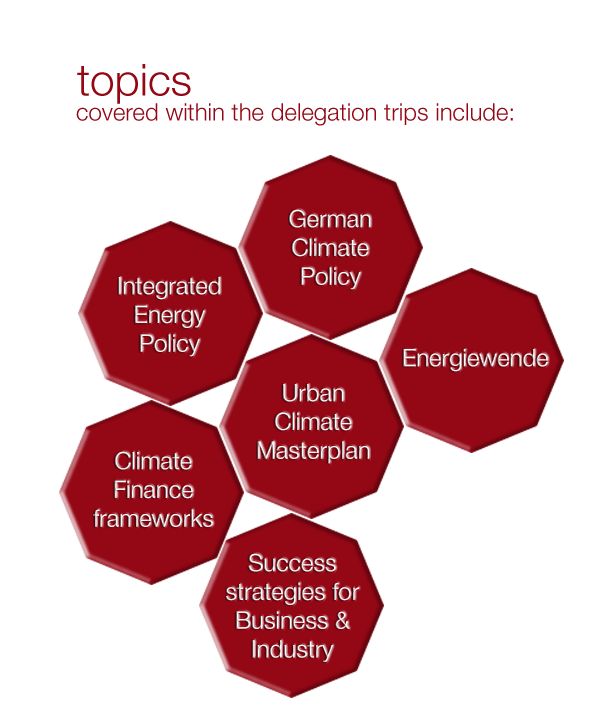

How can climate and energy policies be successfully integrated? Which policy instruments promise success, and which don´t? Which barriers exist for climate and energy policy, and how is Germany approaching those? How to successfully integrate stakeholders in climate and energy policy?

In light of this, Germany offers good insights into integrated climate and energy policies. The country decided to embark on a green energy future path; the so called “Energiewende” is a major infrastructure programme that shifts energy production and use towards a more sustainable future over the coming decades. The “Energiewende” is closely linked with the domestic climate policy agenda, and Germany has put forward a variety of incentive schemes for both fostering GHG mitigation and a sustainable use of energy, such as a feed-in tariff for renewables or conditional loans for end users for energy efficiency in the building sector. Major policy programmes in the European context are for example the European Emissions Trading Scheme.
Delegation trips of the greenwerk. let you explore this specific know-how in Germany, with the aim to make you see, understand and learn the success factors for your local circumstances.
Example
Climate & Energy policy made in Germany
Indicative schedule
Day 1: Berlin “German Energy Policy”
•
Arrival, pick up from Airport
•
Meeting with the Federal Ministry for Economic Affairs and Energy (BMWI)
•
Workshop with policy-makers from federal and state level: “German Energy Policy and the Energiewende”, and discovering challenges and success factors for implementing progressive energy policy in Europe
•
Visit of energy efficient housing model project, supported by KfW investments
•
Day 2: Berlin “German Climate Policy”
•
Meeting with the Federal Ministry of the Environment (BMUB)
•
Workshop with experts and policy-makers from federal and state level: “German climate policy – approaches on local, national, European and international level”
•
Meeting with donors and development banks (e.g. IKI, KfW): “Financing Approaches for Climate Policy in Germany”
•
Berlin urban climate policy site visit
•
Day 3: Hamburg “Climate and Energy Policy for Cites”
•
Trip to Hamburg
•
Meeting with local policy makers and experts
•
Workshop “Challenges for Climate and Energy policy at State- and city level in Germany”, followed by discussion with experts
•
Presentation “Sustainability & Masterplan Climate Protection in Hamburg”
•
Hamburg harbour boat trip
•
Day 4: Hamburg “Business and Industry Day”
•
Meeting with business & industry representatives
•
Discussion on implications of German Climate and Energy policy for business and industry
•
Workshop at the Hamburg Chamber of Commerce: Enabling frameworks for green growth of business and industry in Europe
•
Visit of heavy industry site (aluminum/copper mill)
•
Day 5: Hamburg
•
Wrap up and remaining issues, discussion with local experts and consultants
•
Joint lunch
•
Departure
•
Please contact us for an individual offer that matches your interests and needs.
the greenwerk. climate advisory network
-

the greenwerk. is an advisory firm for climate and sustainable energy policy. Based on our background and expertise, we offer a wide range of services to our clients in both developing and developed countries.
Our work focuses on instruments and activities for promoting greenhouse gas mitigation and renewable energy. With our engagement we support international efforts and climate finance to combat global warming, with technical support on policy frameworks, methodological approaches and instruments. We also facilitate knowledge transfer in the field of climate and energy policy, through delegation trips, workshops and conferences. the greenwerk. fosters research on innovative financing models for transformational changes in the energy sector and sustainable use of resources in the future. Furthermore, we offer project management services, and conduct trainings for junior experts.
For mitigating anthropogenic climate change, we, at
the greenwerk. , strive for fair and sustainable use of global resources and access to renewable energy for all.
We are committed to high quality and integrity in our work and in finding professional solutions with our international partners.
